in here介词用法
45个基本介词的用法
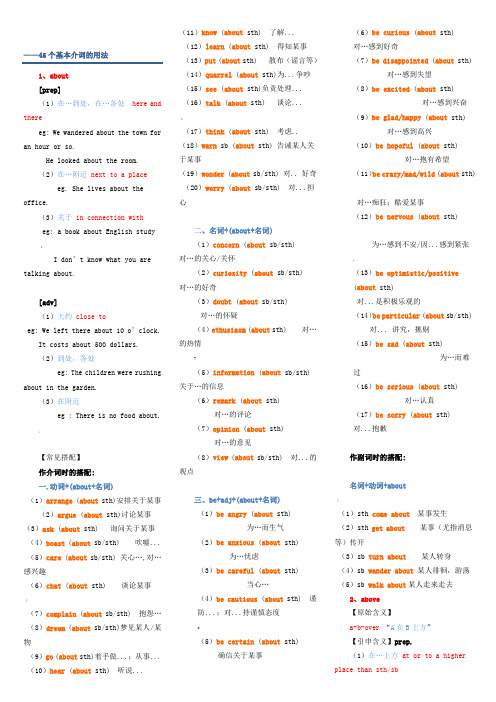
——45个基本介词的用法1、about[prep](1)在…到处,在…各处here and thereeg: We wandered about the town for an hour or so.He looked about the room.(2)在…附近next to a placeeg. She lives about the office.(3)关于in connection witheg: a book about English study:I don’t know what you are talking about.[adv](1)大约close toeg: We left there about 10 o’clock.It costs about 500 dollars.(2)到处,各处eg: The children were rushing about in the garden.(3)在附近eg : There is no food about.、【常见搭配】作介词时的搭配:一.动词+(about+名词)(1)arrange (about sth)安排关于某事(2)argue (about sth)讨论某事(3)ask (about sth) 询问关于某事(4)boast (about sb/sth) 吹嘘...(5)care (about sb/sth)关心…,对…感兴趣(6)chat(about sth) 谈论某事((7)complain(about sb/sth) 抱怨…(8)dream (about sb/sth)梦见某人/某物(9)go(about sth)着手做...;从事...(10)hear (about sth) 听说...(11)know(about sth) 了解...(12)learn (about sth) 得知某事(13)put(about sth)散布(谣言等)(14)quarrel (about sth)为...争吵(15)see (about sth)负责处理...(16)talk(about sth) 谈论...:(17)think (about sth) 考虑..(18)warn sb (about sth) 告诫某人关于某事(19)wonder(about sb/sth) 对.. 好奇(20)worry(about sb/sth) 对...担心二、名词+(about+名词)(1)concern (about sb/sth)对…的关心/关怀(2)curiosity (about sb/sth)对…的好奇(3)doubt (about sb/sth)对…的怀疑(4)ethusiasm (about sth) 对…的热情?(5)information (about sb/sth)关于…的信息(6)remark (about sth)对…的评论(7)opinion (about sth)对…的意见(8)view (about sb/sth) 对...的观点三、be+adj+(about+名词)(1)be angry (about sth)为…而生气(2)be anxious(about sth)为…忧虑(3)be careful(about sth)当心…(4)be cautious (about sth) 谨防...;对...持谨慎态度~(5)be certain (about sth)确信关于某事(6)be curious (about sth)对…感到好奇(7)be disappointed (about sth)对…感到失望(8)be excited (about sth)对…感到兴奋(9)be glad/happy (about sth)对…感到高兴(10)be hopeful (about sth)对…抱有希望(11)be crazy/mad/wild(about sth)对…痴狂;酷爱某事(12)be nervous (about sth)为…感到不安/因...感到紧张.(13)be optimistic/positive(about sth)对...是积极乐观的(14)be particular(about sb/sth)对... 讲究,挑剔(15)be sad (about sth)为…而难过(16)be serious (about sth)对…认真(17)be sorry (about sth)对...抱歉作副词时的搭配:名词+动词+about>(1)sth come about某事发生(2)sth get about某事(尤指消息等)传开(3)sb turn about某人转身(4)sb wander about某人徘徊,游荡(5)sb walk about某人走来走去2、above【原始含义】a-b-over“A在B上方”【引申含义】prep.(1)在…上方at or to a higherplace than sth/sb}eg: The sun rose above thehorizon.(2)数目大于…/重量超过…/价格(能力、地位)高于… more than sth.; greater in number, level or age than sb./sth.eg: There is nothing in the store above 50 cents.(3) 重要性或质量超过、胜过of greater importance or of higher quality than sb/sth eg. I rate her above most other players of her age. (4)声音超过… louder or clearer than another soundeg: I couldn ’t hear her above the noise of the traffic.(5)不至于,不屑于做某事)too good or too honest to do stheg. She is above suspicion.【常见搭配】一、动词+(above+名词)(1)live ( above one ’s income) 入不敷出地生活(2)put A (above B) 把A 看得比B 更重要(3)rise (above sth) 克服...,不受....的影响(4)talk (above one ’s head) 高深莫测地谈论)二、be+(above+名词)(1)be (above oneself )兴高采烈= be in one’s high spirit (2)be (above one’s head ) 难以理解/超出某人理解能力3、across 【原始含义】a-grass “一片草坪”,across 指在平面上经过,就像人走过一片草坪那样。
英语的介词是什么
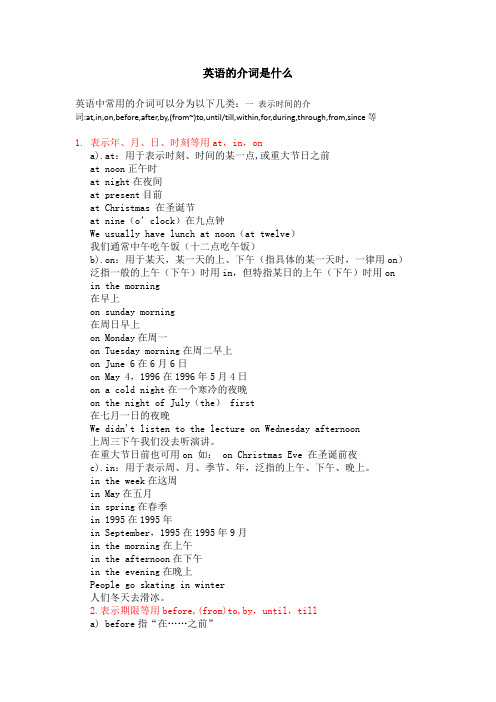
英语的介词是什么英语中常用的介词可以分为以下几类:一表示时间的介词:at,in,on,before,after,by,(from~)to,until/till,within,for,during,through,from,since等1.表示年、月、日、时刻等用at,in,ona).at:用于表示时刻、时间的某一点,或重大节日之前at noon正午时at night在夜间at present目前at Christmas 在圣诞节at nine(o’clock)在九点钟We usually have lunch at noon(at twelve)我们通常中午吃午饭(十二点吃午饭)b).on:用于某天,某一天的上、下午(指具体的某一天时,一律用on)泛指一般的上午(下午)时用in,但特指某日的上午(下午)时用on in the morning在早上on sunday morning在周日早上on Monday在周一on Tuesday morning在周二早上on June 6在6月6日on May 4,1996在1996年5月4日on a cold night在一个寒冷的夜晚on the night of July(the) first在七月一日的夜晚We didn't listen to the lecture on Wednesday afternoon上周三下午我们没去听演讲。
在重大节日前也可用on 如: on Christmas Eve 在圣诞前夜c).in:用于表示周、月、季节、年,泛指的上午、下午、晚上。
in the week在这周in May在五月in spring在春季in 1995在1995年in September,1995在1995年9月in the morning在上午in the afternoon在下午in the evening在晚上People go skating in winter人们冬天去滑冰。
考研-常见介词用法总结
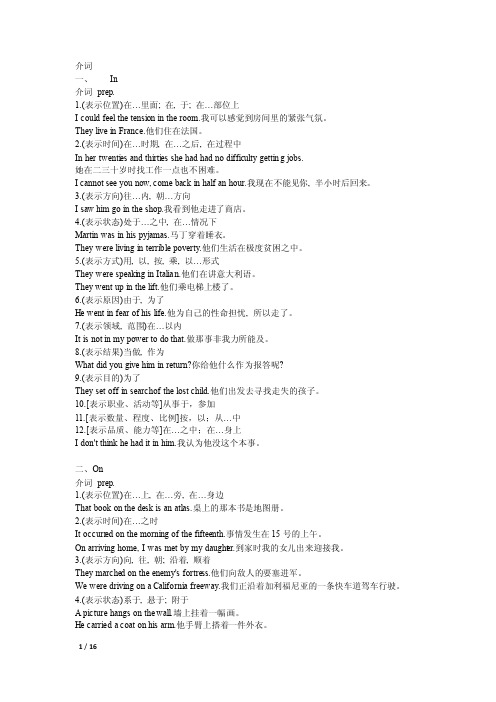
介词一、In介词prep.1.(表示位置)在…里面; 在, 于; 在…部位上I could feel the tension in the room.我可以感觉到房间里的紧张气氛。
They live in France.他们住在法国。
2.(表示时间)在…时期, 在…之后, 在过程中In her twentie s and thirtie s she had had no difficu lty getting jobs.她在二三十岁时找工作一点也不困难。
I cannotsee you now, come back in half an hour.我现在不能见你, 半小时后回来。
3.(表示方向)往…内, 朝…方向I saw him go in the shop.我看到他走进了商店。
4.(表示状态)处于…之中, 在…情况下Martinwas in his pyjamas.马丁穿着睡衣。
They were livingin terribl e poverty.他们生活在极度贫困之中。
5.(表示方式)用, 以, 按, 乘, 以…形式They were speakin g in Italian.他们在讲意大利语。
They went up in the lift.他们乘电梯上楼了。
6.(表示原因)由于, 为了He went in fear of his life.他为自己的性命担忧, 所以走了。
7.(表示领域, 范围)在…以内It is not in my power to do that.做那事非我力所能及。
8.(表示结果)当做, 作为What did you give him in return?你给他什么作为报答呢?9.(表示目的)为了They set off in searchof the lost child.他们出发去寻找走失的孩子。
15个英语最常见的介词用法-极简英语

15个英语最常见介词(in on at of for...)的深层次含义英文中15个最常见的介词in/ on/at/of/ for/by /with/ from/to/as/ about/ around/ off/ through/ over一、in (在..里面)1.表示真实的位置: in the car/room2表示抽象的位置: in the book/movie3.表示状态: in danger, in trouble; in anger3.表示时间: in the morning/afternoon/evening. in April; in 20104.表示方式: in the way; in English5.表示穿着: in black shoes/T-shirt二、on (紧紧地接触-连着)1.表示真实的位置: on the table/wall2.表示抽象的位置: on the radio/TV; on the topic/event3.表示具体的时间: on Monday; on Monday morning; on May 4th4.表示状态: on duty; on holiday; the game is on三、at(在.点上)1.表示真实的位置: at home/the company/the store2.表示抽象的位置: be good/bad at English3.表示具体的时间: at 3 pm;at night; at the age of 204.表示状态: at work-在工作; at table-在吃饭四、Of(的-从属关系)1.表示"无生命主体的":the window of the room; top of the mountain...2.某某市: the city of Bejing3.表示数量: a piece/bx/bottle/pair.. of五、for(为了/因为/对时间/对.而言/支持赞成)1.表示为了":go for a walk; I come here fr my schoolbag2.表示"因为": Thank you for helping me; for the reason3.表示"时间"和: for 3 days; for a week; for a year4.表示对..而言": It is important for me5.表示”支持,赞成": Are you for this plan or against it?六、by(通过.交通工具/在.附近/街至.时间/被)1.表示"通过.交通工具":by train/subway/plane/air/ship/seaI learn English by watchingEnglish movies.2.表示在附近":a table by the window; the house is by the lake3.表示"截至到..时间":by the end of next week; by 20194.表示"被(被动语态)":English is spoken by people all over the world.七、with (伴随)1.表示"和.起":go with:play with;make friends with;cooperate with2.表示"携有,带有":a county with a long history; a house with a big garden3.表示..工具:cut the apple with the knife4.表示"伴随":with the development of the society;with the help of my teacher;I don't have any cash with me.八、from (远离)1.表示"来自":I am/come from China;a gift from my best friend;a man from America2.由"远离"来记短语:stop/prevent/keep sb from doing sth阻止某人做某事be away from...远离...be different from与.不同be absent from缺席....how far is it from here?它离这远The paper is made from wood.这纸是由木头制成的3.表示..到": from...to...由"指向"来理解下列用法:The road leads to Paris.这条路通往巴黎Smoking is harmful to your health.吸烟有害健康the answer to the question.这个问题的答案九、to (指向..)contribute to对..做贡献on one's way to... 在某人去某地的路上belong to属于..be used to doing sth习惯于做某事lead to...导致十、as作为He works as a tour guide.他作为导游工作。
45个基本介词的用法

——45个基本介词的用法1、about[prep](1)在…到处,在…各处here and thereeg: We wandered about the town for an hour or so.He looked about the room.(2)在…附近next to a placeeg. She lives about the office.(3)关于in connection witheg: a book about English studyI don’t know what you are talking about.[adv](1)大约close toeg: We left there about 10 o’clock.It costs about 500 dollars.(2)到处,各处eg: The children were rushing about in the garden.(3)在附近eg : There is no food about.【常见搭配】作介词时的搭配:一.动词+(about+名词)(1)arrange (about sth)安排关于某事(2)argue (about sth)讨论某事(3)ask (about sth) 询问关于某事(4)boast (about sb/sth) 吹嘘...(5)care (about sb/sth)关心…,对…感兴趣(6)chat(about sth) 谈论某事(7)complain(about sb/sth) 抱怨…(8)dream (about sb/sth)梦见某人/某物(9)go(about sth)着手做...;从事...(10)hear (about sth) 听说...(11)know(about sth) 了解...(12)learn (about sth) 得知某事(13)put(about sth)散布(谣言等)(14)quarrel (about sth)为...争吵(15)see (about sth)负责处理...(16)talk(about sth) 谈论...(17)think (about sth) 考虑..(18)warn sb (about sth) 告诫某人关于某事(19)wonder(about sb/sth) 对.. 好奇(20)worry(about sb/sth) 对...担心二、名词+(about+名词)(1)concern (about sb/sth)对…的关心/关怀(2)curiosity (about sb/sth)对…的好奇(3)doubt (about sb/sth)对…的怀疑(4)ethusiasm (about sth) 对…的热情(5)information (about sb/sth)关于…的信息(6)remark (about sth)对…的评论(7)opinion (about sth)对…的意见(8)view (about sb/sth) 对...的观点三、be+adj+(about+名词)(1)be angry (about sth)为…而生气(2)be anxious(about sth)为…忧虑(3)be careful(about sth)当心…(4)be cautious (about sth) 谨防...;对...持谨慎态度(5)be certain (about sth)确信关于某事(6)be curious (about sth)对…感到好奇(7)be disappointed (about sth)对…感到失望(8)be excited (about sth)对…感到兴奋(9)be glad/happy (about sth)对…感到高兴(10)be hopeful (about sth)对…抱有希望(11)be crazy/mad/wild(about sth)对…痴狂;酷爱某事(12)be nervous (about sth)为…感到不安/因...感到紧张(13)be optimistic/positive(about sth)对...是积极乐观的(14)be particular(about sb/sth)对... 讲究,挑剔(15)be sad (about sth)为…而难过(16)be serious (about sth)对…认真(17)be sorry (about sth)对...抱歉作副词时的搭配:名词+动词+about(1)sth come about某事发生(2)sth get about某事(尤指消息等)传开(3)sb turn about某人转身(4)sb wander about某人徘徊,游荡(5)sb walk about某人走来走去2、above【原始含义】a-b-over“A在B上方”【引申含义】prep.(1)在…上方at or to a higherplace than sth/sbeg: The sun rose above thehorizon.(2)数目大于…/重量超过…/价格(能力、… more than sth.; greater in number, level or age than sb./sth.eg: There is nothing in the store above 50 cents.(3) 重要性或质量超过、胜过of greater importance or of higher quality than sb/sth eg. I rate her above most other players of her age. (4)声音超过… louder or clearer than another soundeg: I couldn ’t hear her above the noise of the traffic.(5)不至于,不屑于做某事 too good or too honest to do stheg. She is above suspicion.【常见搭配】一、动词+(above+名词)(1)live ( above one ’s income) 入不敷出地生活(2)put A (above B) 把A 看得比B 更重要(3)rise (above sth) 克服...,不受....的影响(4)talk (above one ’s head) 高深莫测地谈论二、be+(above+名词)(1)be (above oneself ) 兴高采烈= be in one’s high spirit (2)be (above one’s head ) 难以理解/超出某人理解能力3、across 【原始含义】a-grass “一片草坪”,across 指在平面上经过,就像人走过一片草坪那样。
小学英语常用介词用法

小学英语常用介词2)after(在……之后):after breakfast 早饭后,after school 放学后,after class 课后3)before(在……之前):before class 课前,before lunch 午饭前4)at(在):at home在家,at school 在学校,at work 在工作。
5)in(在……里面;用;戴):in English 用英语,in a hat 戴帽子,in front of 在……前面,in line 排成一行,in the end 最后,in the open air 在野外,in a minute立刻,in surprise 惊奇地,in time及时,in trouble 处在困难中。
6)on(在、关于):on one’s way home 回家路上,on duty 值日,on foot 步行,on top of 在……上面。
on the earth 在地球上。
7)under(在……下面):under the desk 在书桌下,under the tree 在树下8)between(在两者之间):between the two children 在两个孩子之间,between A and B 在A 和B之间。
9)beside(在……旁边):sit beside her 坐在她身边,beside the river 在河边。
10)behind(在……后面):behind the house 在房子后面,behind the door 在门后。
11)near(在……附近):near the river 在河边,stand near the door 站在门旁。
12)into(在……里):come into the classroom 进入教室,fall into the water 掉进水里13)outside (在……之外):outside of gate 在大门外。
介词in,on.at,for.with,by,of的基本用法
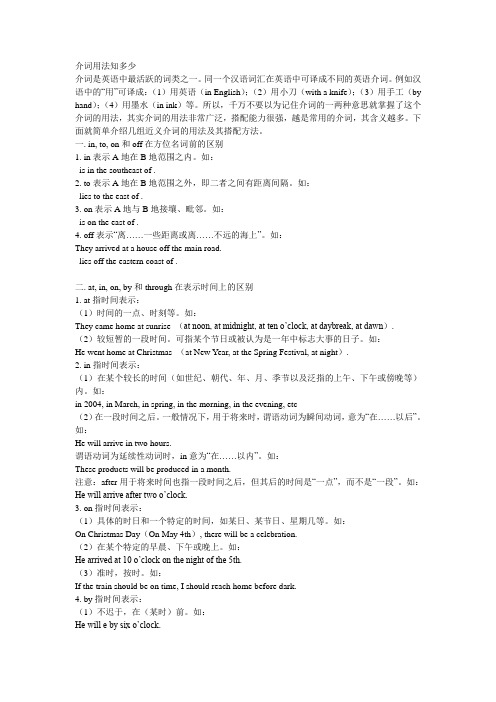
介词用法知多少介词是英语中最活跃的词类之一。
同一个汉语词汇在英语中可译成不同的英语介词。
例如汉语中的“用”可译成:(1)用英语(in English);(2)用小刀(with a knife);(3)用手工(by hand);(4)用墨水(in ink)等。
所以,千万不要以为记住介词的一两种意思就掌握了这个介词的用法,其实介词的用法非常广泛,搭配能力很强,越是常用的介词,其含义越多。
下面就简单介绍几组近义介词的用法及其搭配方法。
一. in, to, on和off在方位名词前的区别1. in表示A地在B地范围之内。
如:is in the southeast of .2. to表示A地在B地范围之外,即二者之间有距离间隔。
如:lies to the east of .3. on表示A地与B地接壤、毗邻。
如:is on the east of .4. off表示“离……一些距离或离……不远的海上”。
如:They arrived at a house off the main road.lies off the eastern coast of .二. at, in, on, by和through在表示时间上的区别1. at指时间表示:(1)时间的一点、时刻等。
如:They came home at sunrise (at noon, at midnight, at ten o’clock, at daybreak, at dawn).(2)较短暂的一段时间。
可指某个节日或被认为是一年中标志大事的日子。
如:He went home at Christmas (at New Year, at the Spring Festival, at night).2. in指时间表示:(1)在某个较长的时间(如世纪、朝代、年、月、季节以及泛指的上午、下午或傍晚等)内。
如:in 2004, in March, in spring, in the morning, in the evening, etc(2)在一段时间之后。
in,of,by,with介词短语用法

繁育。 • 4、by+名词,表原因。
如:by accident/coincidence (主要用作状语,有时候也可以作 表 语)
• I found it by accident.
• Our meeting in Paris was by accident.
四、关于withБайду номын сангаас介词短语的用法归类
• 关于with的介词短语的用法归类
三、关于by的介词短语用法归纳
• 1、by+地点名词。表方位,意为:“在……旁边”。 如: by the lake/ river/tree/ window/door等。
• She searched the top of the hill and stopped to rest on a big rock by the side of the path. 她搜索了山顶,然后停下来在路边的一块大石头上体息。
The law caught up with him We all urged him to go ahead with his plan.
3.系动词 + 过去分词 / 形容词 + 介词 with 如: be angry with ; be associated with ; be bored with ;be covered with;be crowded with ; be busy with 例句:
• 3、by+名词+of 表示方式、方法、手段,意为“借凭;通过;靠;用” 如:by means/force/virtue/way/accident of 等。
• By force of sheer numbers, however, the mosses and ferns reached Hawaii, survived, and multiplied. 但是,仅凭借数量,苔蘚和蕨类到达夏威夷,生存下来,并得以
(完整版)介词宾语用法归纳
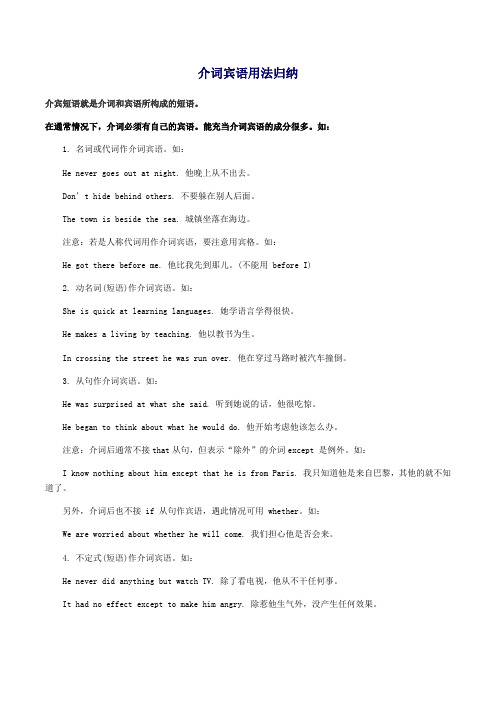
介词宾语用法归纳介宾短语就是介词和宾语所构成的短语。
在通常情况下,介词必须有自己的宾语。
能充当介词宾语的成分很多。
如:1. 名词或代词作介词宾语。
如:He never goes out at night. 他晚上从不出去。
Don’t hide behind others. 不要躲在别人后面。
The town is beside the sea. 城镇坐落在海边。
注意:若是人称代词用作介词宾语,要注意用宾格。
如:He got there before me. 他比我先到那儿。
(不能用 before I)2. 动名词(短语)作介词宾语。
如:She is quick at learning languages. 她学语言学得很快。
He makes a living by teaching. 他以教书为生。
In crossing the street he was run over. 他在穿过马路时被汽车撞倒。
3. 从句作介词宾语。
如:He was surprised at what she said. 听到她说的话,他很吃惊。
He began to think about what he would do. 他开始考虑他该怎么办。
注意:介词后通常不接that从句,但表示“除外”的介词except 是例外。
如:I know nothing about him except that he is from Paris. 我只知道他是来自巴黎,其他的就不知道了。
另外,介词后也不接 if 从句作宾语,遇此情况可用 whether。
如:We are worried about whether he will come. 我们担心他是否会来。
4. 不定式(短语)作介词宾语。
如:He never did anything but watch TV. 除了看电视,他从不干任何事。
It had no effect except to make him angry. 除惹他生气外,没产生任何效果。
关于英语介词的用法及短语搭配
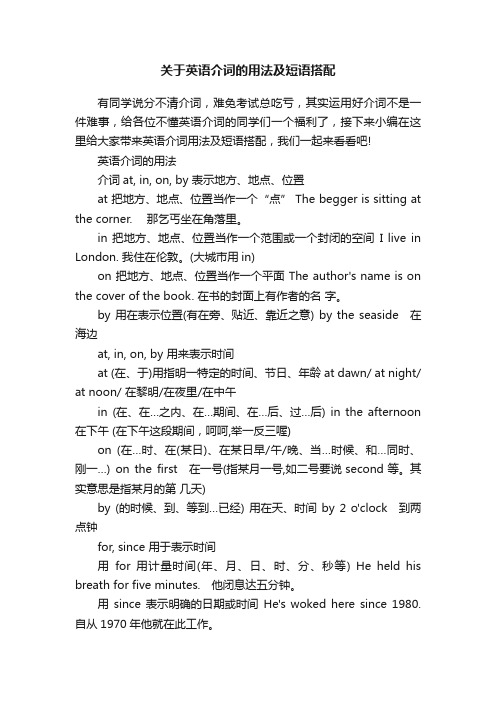
关于英语介词的用法及短语搭配有同学说分不清介词,难免考试总吃亏,其实运用好介词不是一件难事,给各位不懂英语介词的同学们一个福利了,接下来小编在这里给大家带来英语介词用法及短语搭配,我们一起来看看吧!英语介词的用法介词at, in, on, by 表示地方、地点、位置at 把地方、地点、位置当作一个“点” The begger is sitting at the corner. 那乞丐坐在角落里。
in 把地方、地点、位置当作一个范围或一个封闭的空间I live in London. 我住在伦敦。
(大城市用in)on 把地方、地点、位置当作一个平面 The author's name is on the cover of the book. 在书的封面上有作者的名字。
by 用在表示位置(有在旁、贴近、靠近之意) by the seaside 在海边at, in, on, by 用来表示时间at (在、于)用指明一特定的时间、节日、年龄 at dawn/ at night/ at noon/ 在黎明/在夜里/在中午in (在、在…之内、在…期间、在…后、过…后) in the afternoon 在下午 (在下午这段期间,呵呵,举一反三喔)on (在…时、在(某日)、在某日早/午/晚、当…时候、和…同时、刚一…) on the first在一号(指某月一号,如二号要说second等。
其实意思是指某月的第几天)by (的时候、到、等到…已经) 用在天、时间 by 2 o'clock 到两点钟for, since 用于表示时间用for 用计量时间(年、月、日、时、分、秒等) He held his breath for five minutes. 他闭息达五分钟。
用since 表示明确的日期或时间He's woked here since 1980. 自从1970年他就在此工作。
表示动作的介词:to ,toward或不用介词用 to 表示向某处移动 They were driving to work together. 他们一同开车去工作。
(完整版)介词at, by, to, in, for, of, on, from, with的用法
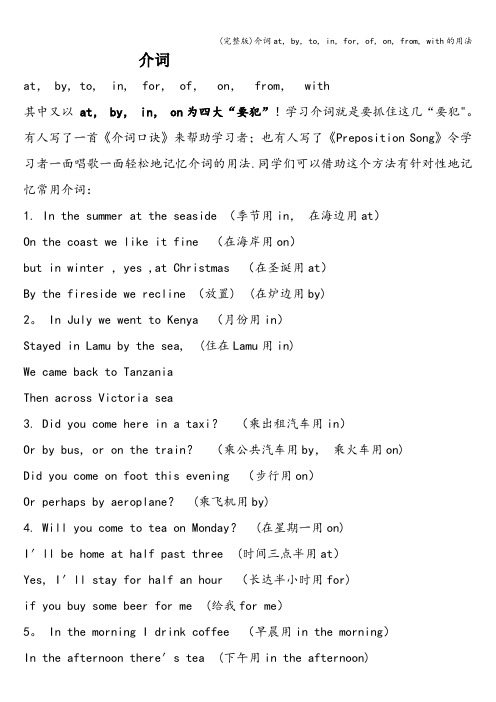
介词at, by, to, in, for, of,on,from,with其中又以at, by, in, on为四大“要犯”!学习介词就是要抓住这几“要犯"。
有人写了一首《介词口诀》来帮助学习者;也有人写了《Preposition Song》令学习者一面唱歌一面轻松地记忆介词的用法.同学们可以借助这个方法有针对性地记忆常用介词:1. In the summer at the seaside (季节用in,在海边用at)On the coast we like it fine (在海岸用on)but in winter ,yes ,at Christmas (在圣诞用at)By the fireside we recline (放置) (在炉边用by)2。
In July we went to Kenya (月份用in)Stayed in Lamu by the sea, (住在Lamu用in)We came back to TanzaniaThen across Victoria sea3. Did you come here in a taxi?(乘出租汽车用in)Or by bus, or on the train?(乘公共汽车用by,乘火车用on)Did you come on foot this evening (步行用on)Or perhaps by aeroplane?(乘飞机用by)4. Will you come to tea on Monday?(在星期一用on)I′ll be home at half past three(时间三点半用at)Yes, I′ll stay for half an hour (长达半小时用for)if you buy some beer for me (给我for me)5。
In the morning I drink coffee (早晨用in the morning)In the afternoon there′s tea(下午用in the afternoon)In the evening I have cocoa (傍晚用in the evening)Yes,at night ,it′s good for me。
介词短语的正确位置和用法详解

介词短语的正确位置和用法详解介词短语是由介词与其宾语(名词、代词、动名词等)组成的短语结构。
在英语中,介词短语的正确位置和用法常常成为初学者的困扰之处。
本文将详细介绍介词短语的正确位置和用法,以帮助读者更好地理解和运用。
一、介词短语的位置1. 放在动词后面一般情况下,介词短语放置在动词之后,修饰该动词的宾语。
例如:- She is talking about her new job.(她正在谈论她的新工作。
)- He is looking for his keys.(他正在找他的钥匙。
)2. 放在名词后面介词短语也可以放在名词之后,修饰该名词。
例如:- The book on the table is mine.(桌子上的书是我的。
)- She bought a dress with a floral pattern.(她买了一件有花纹的连衣裙。
)3. 放在句首有些情况下,介词短语可以放在句首,起到引导状语从句的作用。
例如:- In order to pass the exam, he studied hard.(为了通过考试,他努力学习。
)- With a smile on his face, he greeted his friends.(脸上带着微笑,他向朋友们打招呼。
)二、常见的介词用法1. In(在):- 表示位置:in the park(在公园里)- 表示时间:in the morning(在早上)- 表示方式:in a hurry(匆忙地)2. On(在、在上面):- 表示位置:on the table(在桌子上)- 表示时间:on Monday(在周一)- 表示状态:on fire(起火)3. At(在):- 表示位置:at the bus station(在公交车站)- 表示时间:at 8 o'clock(在8点)- 表示活动:at a party(参加派对)4. To(到):- 表示方向:go to school(去学校)- 表示目的:a present for you(给你的礼物)- 表示比较:superior to(优于)5. from(从):- 表示出发点:come from China(来自中国)- 表示来源:a letter from my mother(我妈妈写的一封信)- 表示距离:far from here(离这里很远)6. with(和):- 表示伴随:go shopping with friends(和朋友一起去购物)- 表示工具:write with a pen(用钢笔写字)- 表示原因:cry with joy(由于喜悦而哭泣)三、常见错误使用介词短语的例子1.错误:She is waiting the bus.正确:She is waiting for the bus.2.错误:I will see you in next week.正确:I will see you next week.3. 错误:He was absent from the meeting.正确:He was absent at the meeting.四、小结介词短语在句子中起到修饰名词、动词、状语从句等作用,用法灵活多样。
in here和in there正确吗?_通过文学作品看here和there用法
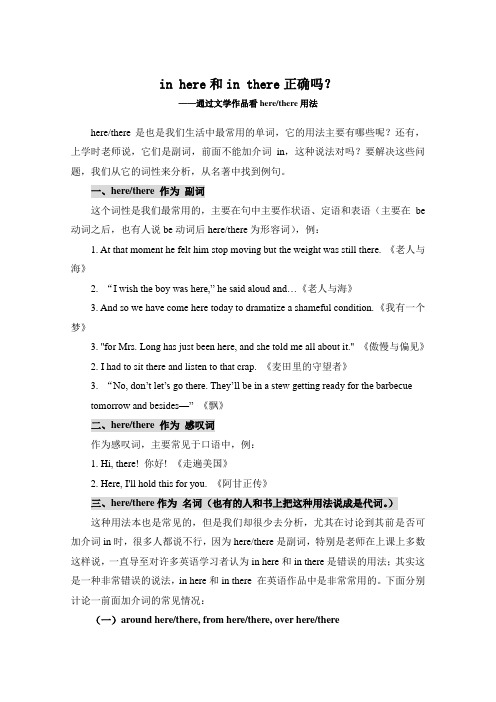
in here和in there正确吗?——通过文学作品看here/there用法here/there是也是我们生活中最常用的单词,它的用法主要有哪些呢?还有,上学时老师说,它们是副词,前面不能加介词in,这种说法对吗?要解决这些问题,我们从它的词性来分析,从名著中找到例句。
一、here/there 作为副词这个词性是我们最常用的,主要在句中主要作状语、定语和表语(主要在be 动词之后,也有人说be动词后here/there为形容词),例:1. At that moment he felt him stop moving but the weight was still there. 《老人与海》2. “I wish the boy was here,” he said aloud and…《老人与海》3. And so we have come here today to dramatize a shameful condition. 《我有一个梦》3. ''for Mrs. Long has just been here, and she told me all about it.'' 《傲慢与偏见》2. I had to sit there and listen to that crap. 《麦田里的守望者》3. “No, don’t let’s go there. They’ll be in a stew getting ready for the barbecuetomorrow and besides—”《飘》二、here/there 作为感叹词作为感叹词,主要常见于口语中,例:1. Hi, there! 你好! 《走遍美国》2. Here, I'll hold this for you. 《阿甘正传》三、here/there作为名词(也有的人和书上把这种用法说成是代词。
here副词和介词用法

here副词和介词用法
“here”是一个常见的英语单词,可以用作副词和感叹词。
下面是“here”副词和介词的用法介绍:
- 用作副词:
- 这里,在这里;向这里。
如:We live here in winter. 我们冬天住在这里。
- 在这点上;这时。
如:Here the speaker paused. 这时演讲人停顿了一下。
- (用于句首,唤起对方注意某人或某物)瞧;在这里;向这里来。
如:It's ten o'clock and here is the news. 现在十点钟,新闻广播开始了。
- 用作感叹词:
- (用以引起注意等)喂!嘿!如:Here, don't cry. 得啦,别哭了。
- (点名时的回答)到!
“here”还可以用作介词,表示运动的方向、行为发生的处所、放置东西的处所等。
例如:Put them here. 把它们放在这里。
介词on,in,under用法详解
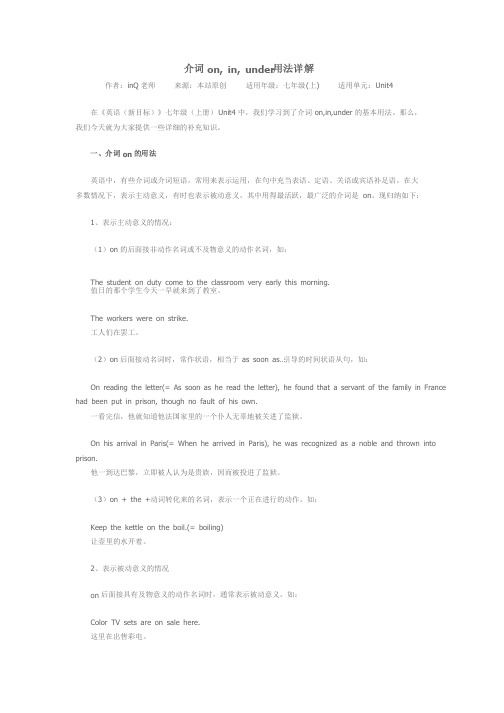
介词on, in, under用法详解适用单元:Unit4 适用年级:七年级(上) 来源:本站原创 作者:inQ老师 在《英语(新目标)》七年级(上册)Unit4中,我们学习到了介词on,in,under的基本用法。
那么,我们今天就为大家提供一些详细的补充知识。
一、介词on的用法英语中,有些介词或介词短语,常用来表示运用,在句中充当表语、定语、关语或宾语补足语。
在大多数情况下,表示主动意义,有时也表示被动意义,其中用得最活跃,最广泛的介词是on。
现归纳如下:1、表示主动意义的情况:(1)on的后面接非动作名词或不及物意义的动作名词,如:The student on duty come to the classroom very early this morning. 值日的那个学生今天一早就来到了教室。
The workers were on strike. 工人们在罢工。
(2)on后面接动名词时,常作状语,相当于as soon as…引导的时间状语从句,如:On reading the letter(= As soon as he read the letter), he found that a servant of the family in France had been put in prison, though no fault of his own. 一看完信,他就知道他法国家里的一个仆人无辜地被关进了监狱。
On his arrival in Paris(= When he arrived in Paris), he was recognized as a noble and thrown into prison. 他一到达巴黎,立即被人认为是贵族,因而被投进了监狱。
动词转化来的名词,表示一个正在进行的动作。
如:(3)on + the + 动词转化来的名词,表示一个正在进行的动作。
如:Keep the kettle on the boil.(= boiling) 让壶里的水开着。
介词 超全的英语介词用法归纳总结~优秀6篇
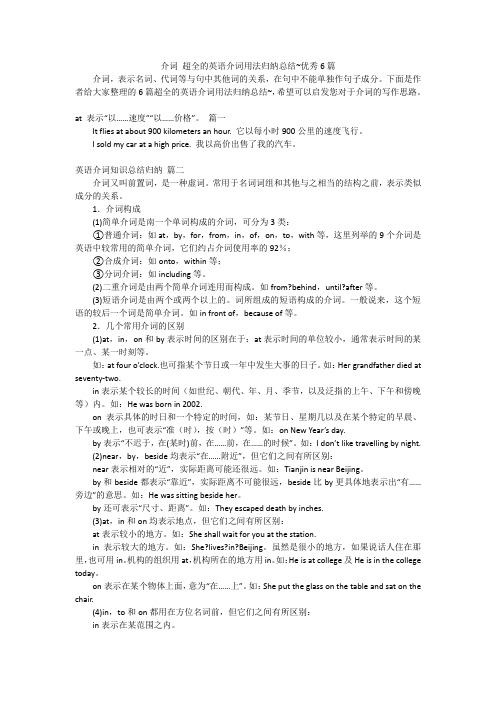
介词超全的英语介词用法归纳总结~优秀6篇介词,表示名词、代词等与句中其他词的关系,在句中不能单独作句子成分。
下面是作者给大家整理的6篇超全的英语介词用法归纳总结~,希望可以启发您对于介词的写作思路。
at 表示“以……速度”“以……价格”。
篇一It flies at about 900 kilometers an hour. 它以每小时900公里的速度飞行。
I sold my car at a high price. 我以高价出售了我的汽车。
英语介词知识总结归纳篇二介词又叫前置词,是一种虚词。
常用于名词词组和其他与之相当的结构之前,表示类似成分的关系。
1.介词构成(1)简单介词是南一个单词构成的介词,可分为3类:①普通介词:如at,by,for,from,in,of,on,to,with等,这里列举的9个介词是英语中较常用的简单介词,它们约占介词使用率的92%;②合成介词:如onto,within等;③分词介词:如including等。
(2)二重介词是由两个简单介词连用而构成。
如from?behind,until?after等。
(3)短语介词是由两个或两个以上的。
词所组成的短语构成的介词。
一般说来,这个短语的较后一个词是简单介词。
如in front of,because of等。
2.几个常用介词的区别(1)at,in,on和by表示时间的区别在于:at表示时间的单位较小,通常表示时间的某一点、某一时刻等。
如:at four o’clock.也可指某个节日或一年中发生大事的日子。
如:Her grandfather died at seventy-two.in表示某个较长的时间(如世纪、朝代、年、月、季节,以及泛指的上午、下午和傍晚等)内。
如:He was born in 2002.on表示具体的时日和一个特定的时间,如:某节日、星期几以及在某个特定的早晨、下午或晚上,也可表示“准(时),按(时)”等。
- 1、下载文档前请自行甄别文档内容的完整性,平台不提供额外的编辑、内容补充、找答案等附加服务。
- 2、"仅部分预览"的文档,不可在线预览部分如存在完整性等问题,可反馈申请退款(可完整预览的文档不适用该条件!)。
- 3、如文档侵犯您的权益,请联系客服反馈,我们会尽快为您处理(人工客服工作时间:9:00-18:30)。
in here与in there
here 和there 虽为副词,但它们却可以与某些介词搭配,其中最典型的就是in here 和in there。
一、in here
in here 和here含义有所不同:in here 指“在这里面”,here 仅表示“在这儿”。
It is very hot here. 这里很热。
(可能指一个较大的范围)
It is very hot in here. 这里面很热。
(可能指一个较小的范围,尤其指一个相对封闭的范围)根据语意的需要,我们也可以说around here(在这附近,在这周围),over here(到这边来)等。
如:
Methane gas does collect in the mines around here. 周围的矿井里的确有沼气聚积。
The majority of people around here are decent people. 这里的大多数人都很正派。
Diana says you told her to come over here. 戴安娜说是你让她到这儿来的。
Come over here and I’ll tell you a secret. 你如到这儿来,我就告诉你一个秘密。
Don’t stay there in the corner by yourself. Come over here and talk to us. 不要独自呆在角落里。
过来跟我们聊聊吧。
但是,英语习惯上不能说at here。
二、in there
in there与in here 的用法差不多,意思指“在那儿里面”(尽管在具体翻译时不一定这样表达,但它的意思通常应这样理解)。
如:
Get back in there, or you'll be sorry. 滚回那边去,否则你会后悔的。
There's room in there for a family of five. 那儿能住下五口之家。
Every aircraft in there has sustained some damage. 那里的每架飞机都受到了一些损坏。
She nodded towards the drawing room. “He's in there.”她朝客厅方向扬了扬头说:“他在那里面。
”
There's room in there for a family of five. 那儿能住下五口之家。
根据语意的需要,我们也可以说around there(在那附近,在那周围),over there(在那边)等。
如:
There are scarcely any flies left around there. 那周围几乎没有任何苍蝇了。
The post office is somewhere around there. 邮局就在那一溜儿。
There were several kids lolling around outside the club. 有几个小孩在俱乐部外面闲荡。
The hydraulic lift is over there. 液压升降机在那儿。
His house is over there a piece. 他的房子在那边,离这儿有一段距离。
The girl over there about six years old called him daddy. 那边那个大约六岁的女孩叫他爸爸。
但是,英语习惯上不能说at there.。
